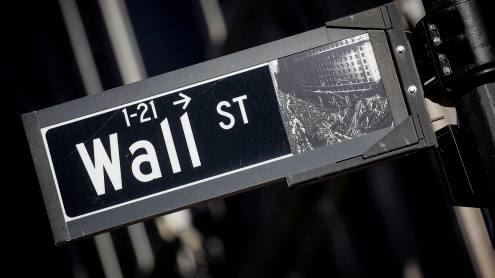The Barclays equity capital markets (ECM) team is on a roll. It enjoyed a particularly strong first quarter this year, and in Europe, as the end of May approached, it had led more milestone equity transactions year to date than any other bank.
“This year, we had the second-strongest first quarter in global ECM for the past six years,” says Tom Swerling, global head of ECM at Barclays. “That’s against the backdrop of a relatively complicated primary market.” With initial public offerings (IPOs) at a low ebb, the team has still been able to deliver a sound financial performance via accelerated book-builds (ABBs), rights issues and its equity-linked and financing solutions business.
With the five top spots in international ECM league tables generally occupied by US bulge-bracket firms, Barclays currently makes the top six and intends to stay there. Having acquired the US business of Lehman Brothers in 2008, it has the largest US presence of any European bank, and Mr Swerling now spends alternate weeks in London and New York.
The bank has a newly appointed global head of equities, Scott McDavid, formerly co-head of equities trading for Americas at Morgan Stanley. Its new global head of equities distribution is Ronnie Wexler, who spent nearly 20 years with Goldman Sachs. Both will be based in New York.
In its ambitions to grow what former CEO Jes Staley called “a bulge-bracket transatlantic investment bank”, Barclays’ most formidable European rival was once the now imploded Credit Suisse. UBS, which recently acquired its compatriot, has a more selective investment banking strategy and will be preoccupied with absorbing Credit Suisse for some time yet.
Mr Swerling says that Barclays’ recent success in European ECM is a function of consistency, as well as the management team’s insistence on excellence. “Our clients want a European bank that can compete toe-to-toe with the big five,” he says.
In a year of bigger deals in European equities, that is what Barclays’ ECM team appears to have been doing. Lawrence Jamieson, the bank’s co-head of Europe, the Middle East and Africa (EMEA) ECM, points out that European ECM volumes have been up around 15% this year, while the number of deals has fallen by roughly the same amount.
“We have seen the return of the big deal,” Mr Jamieson says. “That’s where investors feel most comfortable participating in meaningful size — where they have the ability to trade around the transaction and to hedge their positions.”
Trendsetting transactions
In European “franchise-defining” transactions, Barclays has led more than any of its competitors this year, Mr Jamieson says. “These are not just the biggest deals, but sometimes the first of a kind and/or bellwether transactions for overall sentiment.”
Despite a dearth of IPOs, Barclays was joint global coordinator on Lottomatica’s €600m April listing in Milan. This was the largest European IPO since February 2022, with the exception of Porsche. The transaction, which priced at the low end of the initial range, valued the Italian gaming business at €2.265bn.
“The IPO market is in its reopening phase, as certain private equity holders take a more positive view,” Mr Jamieson believes. “They are not selling growth-at-all-costs businesses, but rather more defensive names with a strong record of profitability, cash generation and paying dividends.”
The IPO market is in its reopening phase, as certain private equity holders take a more positive view
The bank has also been taking advantage of an increase in large block trades. “Some large corporates have been selling down stakes,” Mr Swerling notes. “As the cost of capital has become more expensive, rationalising the balance sheet has become more important, with investors being laser-focused on capital allocation.”
Barclays was able to capitalise on its long-standing relationship with Femsa, when the Mexican bottler decided to sell nearly half of its 14.7% interest in the Heineken group. The bank was mandated as sole financial adviser to Femsa in a simultaneous €3.2bn ABB and €500m exchangeable bond offering, executed in February.
This was the largest consumer ECM transaction for 15 years and the largest ABB (primary or secondary) since 2015. It included a commitment by Heineken to buy back €1bn of its own shares. Shares in both Heineken and Heineken Holding were on offer. Books were covered for the initial €3bn ABB in 35 minutes, allowing it to be upsized.
“We had an interesting role,” Mr Swerling says. “Femsa specifically wanted us as adviser and we were mandated in November 2022. We negotiated the anchor investors and the buyback, and led the exchangeable bond component.”
With Barclays as a joint bookrunner, Bank of America, Goldman Sachs and Morgan Stanley were mandated as bookrunners the day before the deal was announced. “So, we were very much running the transaction,” Mr Swerling says. The deal was priced at a 3.5% discount for Heineken and 3.6% for Heineken Holding — the tightest discounts year to date for a European ABB.
On May 31, Barclays acted as sole financial adviser for Femsa’s €3.7bn secondary sale in the Heineken group, consisting of a €3.3bn secondary ABB and a €333m bilateral sale of additional shares purchased by Heineken. This marks a complete sell off of Femsa’s stake since initially acquiring it in January 2010.
LSEG’s sell-down
Barclays was one of only two banks (along with Citi) mandated as joint global coordinators on both legs of London Stock Exchange Group’s (LSEG) secondary placing exercise, which raised £4.7bn in total. The shares were sold by Thomson Reuters and a Blackstone-led consortium, which received them in payment for financial data provider Refinitiv.
They sold 28 million shares, around a third of their position, which had been freed from lock-up at the end of January. After a wall-crossing process, the placing was launched in early March with an initial size of £1.7bn. Books were covered in 20 minutes and the deal was upsized to £2bn. The shares were priced at £71.50, a discount of 4% to the previous close.
On the back of a strong share price performance and several reverse enquiries, the sellers returned to market in mid-May with another 28 million shares, later increased to 33 million. This time they fetched £80.50, a 5% discount to the previous close, making the proceeds worth £2.7bn.
This was the largest UK sell-down since 2018 and the second-largest secondary European ABB since 2015. At its conclusion, Thomson and Blackstone still owned some 20% of LSEG.
Noteworthy transactions
The team led the first European convertible deal of the year, a €1bn transaction for German defence systems supplier Rheinmetall. It also helped to reopen the real estate convertible market with a €480m five-year debut deal for Swedish property company Balder, the first in this sector for two years.
Other notable transactions included Europe’s largest rights issue this year, for tourism group Tui. The €1.83bn capital increase was priced at a 39.8% discount to the theoretical ex-rights price and so enjoyed a 90.9% take-up. The proceeds were used to repay German state aid and reduce debt.
Funding costs are a big focus for corporates and convertibles can offer significant cash coupon savings
This and other deals have helped the ECM team to raise its profile in Germany, where it is ranked third, year-to-date by volume, according to Dealogic. In May, the bank named Foruhar Madjlessi as co-head of ECM EMEA, to work alongside Mr Jamieson. Mr Madjlessi was formerly head of ECM for Germany, Switzerland and Austria at Deutsche Bank.
Contributing to the team’s German performance was February’s €1bn convertible bond plus cash tender offer for Germany-based Delivery Hero, where Barclays was joint global coordinator and bookrunner. “The proceeds were used to refinance an existing convertible,” says Omar Alghanim, Barclays’ head of equity-linked and financing solutions. He notes that more companies are focusing on convertibles as a form of low-cost debt in a high yield environment.
“Funding costs are a big focus for corporates and convertibles can offer significant cash coupon savings,” Mr Alghanim says. “As interest rates have gone up, companies can save between 2% and 5% per annum with convertibles versus conventional debt.”
For the dedicated base of convertibles investors, in volatile times the instruments offer the downside protection of a bond with the upside potential of equities. Mr Alghanim believes convertibles issuance will rise over the next couple of years as issuers are not only attracted by the lower cost but are also drawn by the benefits of diversifying their investor base and funding sources.
He also reports increased activity in equity financing. More private equity houses, corporates and holding companies are engaging in strategic stake management with the help of derivatives and margin loans. “They have stakes, but they don’t necessarily like the share price for disposal and they want to manage their risk,” he explains. “So, they use the stake to raise finance in creative ways.”







